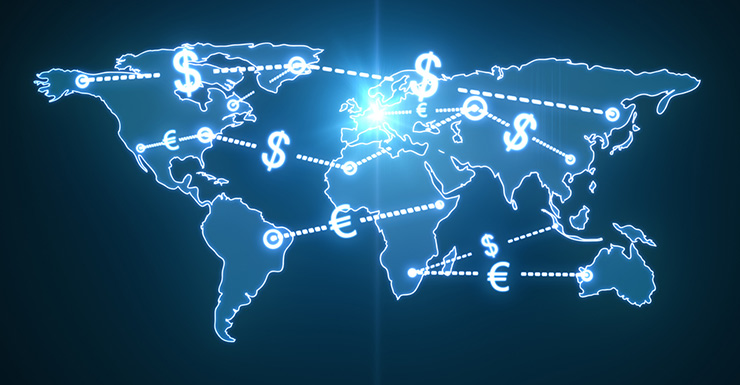(Editor’s note: This was originally posted as test content on LinkedIn. We’re reposting with updated information.)
Expats … you need to know about TransferWise.
Why? Because a lot of billionaires understand the London-based, peer-to-peer money transfer service’s potential to make your life easier … and to disrupt the financial transactions industry in the process.
Only five years old, TransferWise has emerged as one of Europe’s rare Unicorns, with a recent valuation just over $1 billion.

You might not care about that. But you should about this … in five years, TransferWise has handled $5 billion in transfers.
TransferWise’s tagline is, “Money without Borders.” If you’ve ever tried to pay a bill or fine in a country outside your nation of residence, you’ll know how frustrating and unjustifiably expensive that can be.
Unlike the banks, TransferWise actually gives you the real mid-market exchange rate for international payments while charging a reasonable fee. Far reasonable than even our own U.S.-based bank, as we found out the hard way.
In summer, 2015, we got two parking tickets in Eindhoven, Dispatches’s global headquarters, as we like to call it. The tickets were 98 euros and 46 euros. The fines came with instructions how to pay them, but you could NOT pay online with a credit card or with PayPal. Of course not. That would have been too easy.

So, my wife Cheryl goes to our local bank “because that’s where I thought you transferred money,” she said. She was there for 45 minutes because the one person who knew how to transfer money wasn’t there! An hour later, Cheryl gets a phone call from the bank: “You were supposed to stay for another 30 minutes to wait for money to clear. Where did you go?”
Seriously? We’ve only banked there for 7 years, and they have all our cash. The lady at the bank tells Cheryl, “Before I make the transfer, I thought I’d better tell you the fees are going to be more than the fines.”
What?
The bank’s fee per transfer was going to be $40, or $80 total. Then, there was the exchange rate fee for converting dollars to euros. Plus, each bank along the long, long trail of transfers would add its own fees! All this was going to total more than $200 for a grand total of $346.
In addition to charging high fees, banks are also adding hidden mark-ups to international payments. Instead of using the mid-market exchange rate, which can be found in newspapers or Google, the banks present misleading exchange rates that enable them to secretly charge SMEs again for the same transaction.
Cheryl had already read about TransferWise as we were researching our move to Europe. Thank God. She went online, set up an account, filled in the fields, hit “transfer” and it was $3 fee per transfer, or $6 in fees to pay those tickets as opposed to maybe $200!
Four days later, TransferWise moved the money from our account to the Netherlands’ Department of Scofflaw Tourists.
“It’s unbelievable,” she said. Cheryl’s highest rating.
How does TransferWise do it so inexpensively compared to banks? Good question. So I went to the company’s website, and it turns out it’s magic, with fairies turning your money to pixie dust. Which is the ultimate in disruptive technology, right?
Seriously, the way TransferWise execs explain it in the video, it’s one of those “why didn’t I think of this” epiphanies along the lines of Lyft and AirBnB: Party A needs euros but has dollars. Party B needs dollars, but has euros. So let’s bring them together digitally and charge them a fee.”
In this case, I have dollars I want to pay to the Dutch government in fines. On the other end of this transaction, TransferWise finds someone or several someones who needs to trade their euros for my dollars so they can buy Katy Perry’s Greatest Hits from iTunes or something. The money, as it turns out, never leaves its country of origin, so you don’t need banks. Wow!
Another way TransferWise is changing the game is, they give you the real exchange rate, also known as the mid-market rate, instead of the banks’ rates, distorted by fees. The exchange rate is guaranteed as long TransferWise receives your money in 24 hours.
And this tells you a lot: Vikram Pandit, former CEO of CitiGroup, one of the United States’ largest banks, is an investor. So is Silicon Valley giant Andreessen Horowitz, Richard Branson’s Virgin investment vehicle, Kima Ventures and other mega-VCs.
That’s because the investors understand that TransferWise and other fintech innovators are disrupting a business model that was punitive for both consumers and small businesses. For example, the banks charge small businesses misleading exchange rates. And guess what … big companies get much better rates. A study paid for by Tranferwise showed small to medium enterprises, or SMEs, were overcharged more than 4 billion pounds in 2015 while paying for products, services and talent abroad as the world becomes more global. Okay, the “study” was paid for by the beneficiary, but it was done by YouGov, which – yes – is a market research firm, but does solid research. But you get the idea.

You know what I like about TransferWise? When you check out their website and see interviews with their execs, it’s clear the company still has the wide-eyed sense of adventure, innovation and dedication to transparency and customer satisfaction every great startup has. And THAT is the opposite of the experience we had with our bank.
More on TranferWise:
TransferWise, like so many transformative tech companies, was founded by Estonians. Taavet Hinrikus, Skype‘s first employee, and financial consultant Kristo Käärmann came up with the idea, inspired by their own frustrations in transferring money. TransferWise has received multiple rounds of funding, but remains a private company based in London.
- TransferWise is moving into the U.S. with a business-payments service – The Wall Street Journal. Roughly 4 million U.S. companies make international payments and nearly 1 million have freelancers or employees abroad, according to TransferWise CEO Taavet Hinrikus.
Co-CEO of Dispatches Europe. A former military reporter, I'm a serial expat who has lived in France, Turkey, Germany and the Netherlands.















